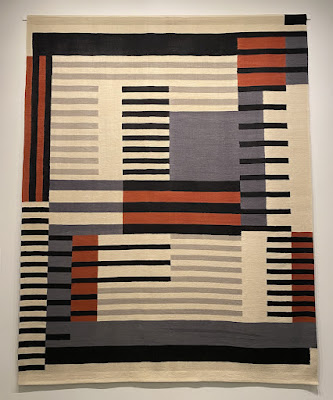 |
| Wall hanging designed by Albers in 1925 and woven in 1983 A few guild friends and I took a road trip last week to see the Syracuse University Art Museum exhibit, "Anni Albers: Work with Materials," curated by Fritz Horstman, education director of the Josef and Anni Albers Foundation. The exhibit is up through December 11 and we were thrilled to view some of her designs up close and personal. The title of the exhibit comes from an essay she wrote, "Work with Materials," in 1937. Here's a quote from that essay: But if we want to get from materials the sense of directness, the adventure of being close to the stuff the world is made of, we have to go back to the material itself, to its original state, and from here on partake in its stages of change. Such eloquence and insight! To me, she writes as well as she weaves. In her classic book, On Weaving, she devotes a chapter to "Tactile Sensibility," to explore and emphasize that unique aspect of our craft. |
We touch things to assure ourselves of reality. We touch the objects of our love. We touch the things we form. Our tactile experiences are elemental. This tactile sense, in addition to the powerful tools of color and structure, is what I love about her work. She explores and exploits the textural aspect of weaving and in so doing appeals to two of our senses -- those of touch and sight. Below, a sample woven on a clear plastic warp with a rough fiber (perhaps jute, I'm not sure) in the weft. The exhibit included more than 100 objects from the collection, from rugs to prints to textile samples. Small as they were, they revealed her keen mind and powerful design sense. Here's a leno sample that uses a gold metallic yarn in the weft: Below is a room divider designed by Albers for a textile company in the early 1980s. By 1968, at the age of 69, she had given up her looms and, as Horstman writes in the exhibit pamphlet, "embarked on a breathtaking decade-plus in which she worked almost exclusively in drawing and printmaking". Her appreciation of tactile sensibility, as she termed it, can be seen in her embossed prints, some of which were included in the exhibit. This one, below, is particularly striking. It's described as "zinc plate embossing on metallic laminate on paper" from 1970. (If you look closely, you can see my reflection as I'm taking the photo, which adds another element to the image.) Our guide for the exhibit was museum curator Melissa Yuen, who began by showing us a series of flat-woven wall hangings designed (but not woven) by Albers. The piece featured at the beginning of this blog post began with a screenprint on paper from the portfolio "Connections", created by Albers while studying at the Bauhaus in 1925. The exhibit gives proof of her strengths in several media and techniques. Below is another wall hanging woven in 1984 according to a design by Albers. As most weavers know, Anni Albers is one of the great lights in weaving and textile design in the 20th century. What some may not know is that she was one of the first women ever -- and definitely the first textile artist ever -- to have a solo exhibition at MoMA in New York City, which took place in 1949. The press release for the exhibit called her "one of the most imaginative and daring of modern weavers in the United States". Her ability to take textiles from the realm of utilitarian craft to abstract art was admired by 20th century artists like Philip Johnson and Jack Lenor Larsen -- as was her versatility. As Fritz Horstman writes in the exhibit brochure, "the exhibition highlights the nimbleness with which Albers moved between mediums, and her fluid transitions between creating artwork and designing more functional objects." The show also provides evidence of her meticulous study and process, shown here in her diagrams of doubleweave structure. (I had to take the photo at an angle to avoid capturing the shadow of my iPhone.) It is as if she was perpetually striving to understand "the stuff the world is made of" -- and the results continue to bring joy and inspiration to weavers everywhere. "Red Lines on Blue" 1979 Thanks for reading! |

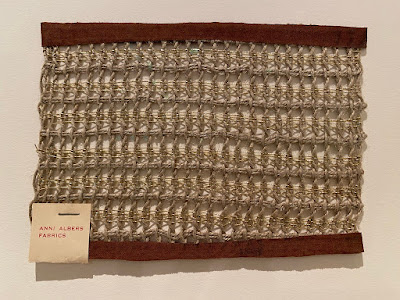
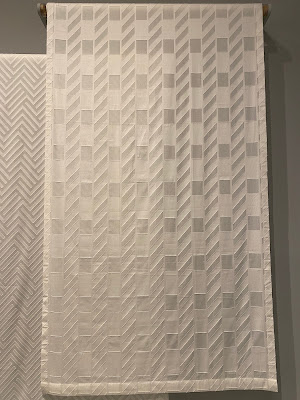

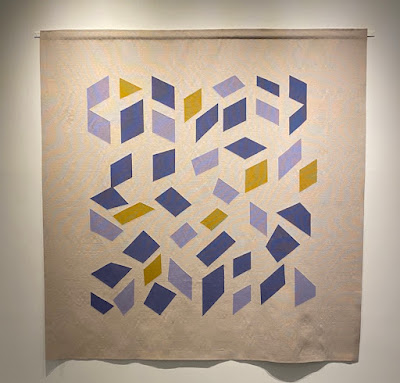

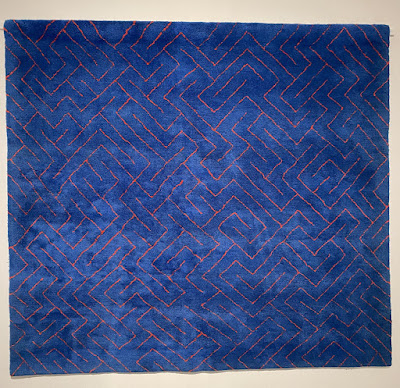
I love Anni Albers’ work! Thank you for this glimpse into a show I won’t be able to see. Such insight and design sense….sigh…..
ReplyDeleteShe constantly teaches us, right? This was not a big exhibit -- but still, it was a great opportunity.
ReplyDeleteThank you so much for spreading the news of this show! I was able to go and see it since I live in the area. I also let my weavers' guild know about it.
ReplyDeleteMary Denes
You're welcome, Mary. Exhibits like this can just sneak up on us unawares. I like to think we're all in the business of promoting weaving!
ReplyDelete